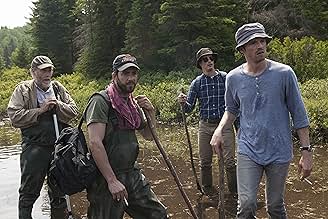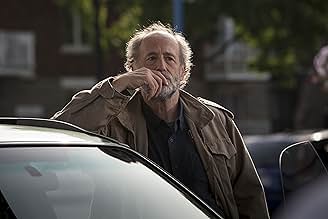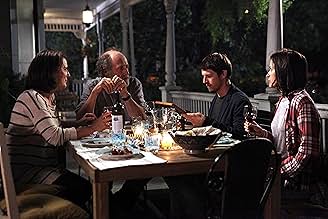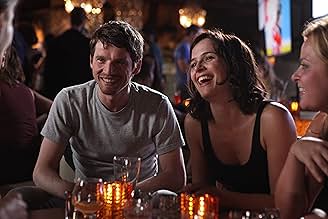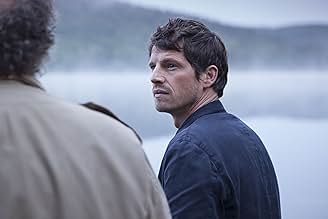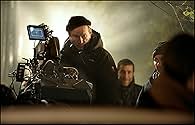Mathieu nunca ha conocido a su padre. Su madre siempre le ha dicho que es fruto de una aventura de una noche.Mathieu nunca ha conocido a su padre. Su madre siempre le ha dicho que es fruto de una aventura de una noche.Mathieu nunca ha conocido a su padre. Su madre siempre le ha dicho que es fruto de una aventura de una noche.
- Dirección
- Guionistas
- Elenco
- Premios
- 2 premios ganados y 5 nominaciones en total
Opiniones destacadas
A Kid tells the story of Mathieu, a Frenchmen who grew up in Paris, the son of a single mother. One day he receives a phone call that the father he never knew has died in Montreal, and that the funeral will be in a couple days. He decides to travel to Montreal to discover the brothers he just learned he had.
Upon his arrival in Montreal, Mathieu is picked up by Pierre, a friend of the deceased, Jean. He asks why he wants to do all this, to impose on a family that just lost their father and husband. In the end Mathieu decides to be quiet on who he is when he meets the brothers.
The acting by the main actors does a good job of bringing you into the thinking of these characters. How one would react in such a situation is hard to say, but the interactions here are believable. All twists and turns in the plot also seem logical and help bring the viewer further and deeper into Mathieu's world and his discovery of his family on the other side of the Atlantic.
Upon his arrival in Montreal, Mathieu is picked up by Pierre, a friend of the deceased, Jean. He asks why he wants to do all this, to impose on a family that just lost their father and husband. In the end Mathieu decides to be quiet on who he is when he meets the brothers.
The acting by the main actors does a good job of bringing you into the thinking of these characters. How one would react in such a situation is hard to say, but the interactions here are believable. All twists and turns in the plot also seem logical and help bring the viewer further and deeper into Mathieu's world and his discovery of his family on the other side of the Atlantic.
A different take on a now grown adult seeking the dad & thus the family he didn't know because of a one night stand decades ago. The man a French Canadian w/a Parisian female. A small twist. Logical, but no DNA searching or comparisons. A bit incomplete ending. This seeking adult has a marital problem of his own which is unresolved if not made more complicated by a not healthy attachment to another female. The scene of two adults w/children on their laps in the back seat of a car is a serious & potentially deadly error in the script - dumb. Lots of smoking by a lot of people. A cheap way to create a visual that also has it's consequences - also dumb. Outcome w/painting misplaced; should be w/female. Not a well resolved ending.
I admit having a strong appetite for the filmography of the French director Philippe Lioret. His films rhyme with simplicity, altruism, empathy, benevolence and sensitivity. Nowadays, this kind of observation is unfortunately rare. Moreover, Philippe Lioret has become a label of quality.
Following a call, a young Parisian dad learns of the death of his Quebec father when he did not know him, absolutely not, his mother having always hidden his identity. This trip on the other side of the Atlantic will be the opportunity to discover a step-family he did not know. And to know a little bit about himself.
My favorite scenes: Mathieu and Bettina together near the painting (there is a before and an after). Mathieu, his brothers and Pierre around the lake (a disappointment up to the expectations). The near-final scene in the car (it's particularly moving: it's not my style, but I almost had tears in my eyes)
As a synthesis, the movie is excellent. The casting, the dialogues and the directing are delightful.
Following a call, a young Parisian dad learns of the death of his Quebec father when he did not know him, absolutely not, his mother having always hidden his identity. This trip on the other side of the Atlantic will be the opportunity to discover a step-family he did not know. And to know a little bit about himself.
My favorite scenes: Mathieu and Bettina together near the painting (there is a before and an after). Mathieu, his brothers and Pierre around the lake (a disappointment up to the expectations). The near-final scene in the car (it's particularly moving: it's not my style, but I almost had tears in my eyes)
As a synthesis, the movie is excellent. The casting, the dialogues and the directing are delightful.
With sadness and distress I've read (some) of the IMDb reviews on Le Fils de Jean. However, it shouldn't be surprising as most people are prone to blockbusters and sound bytes.
Although I wouldn't exactly describe this as the art of slow cinema, it nevertheless moves along with a gentle pace, portraying gentle emotions and the odd outburst or two. Primarily it's a film about relationships between parents and children, and vice versa and between siblings.
Very seldomly do French films hit the viewer over the head with melodramatic confrontations and every realisation and experience rushing along like car chases. Most of the time they allow the viewer to discover the characters and have rare looks into their inner beings. Although this is not particular or peculiar to French films, a general sense of melancholy and romance are ever subtly present in French works.
One reviewer in particular slates the acting. I can only presume that said person is not acquainted with the works of Ingmar Bergman, Andrei Tarkovsky, Theo Angelopoulos and most works from Europe. Even thrillers such as The Hunt (Thomas Vinterberg) are not shoved down viewers' throats with grandstanding.
The great French film masters (Robert Bresson, Agnes Varda et al) also, like thorough painters, take time to uncover their characters, their stories and their situations.
I won't compare Le Fils de Jean (directed by Philipe Lioret, also responsible for the wonderful Welcome starring Vincent Lindon) with any of the great masters' films, but it's a gem. Mathieu, who visits Canada to find out more about his (presumed dead) father Jean and is taken to the lake where he supposedly drowned, finds himself in a different world. Albeit all French speaking, even certain expressions and customs are foreign to him (and vice versa again).
This is not operatic, melodramatic, grand scale acting. This is gently coming to grips with the soul and marrow of every character. This is real. Sincere. Supported by excellent photography, the wonderful script is brought to life by director and actors and the film is strewn with small, delicate delights. And. a big AND, not everything is explained as in Hollywood films. The viewer can come to own conclusions. Mine were certainly being moved, being transported and being touched.
This is worth a few revisits.
Although I wouldn't exactly describe this as the art of slow cinema, it nevertheless moves along with a gentle pace, portraying gentle emotions and the odd outburst or two. Primarily it's a film about relationships between parents and children, and vice versa and between siblings.
Very seldomly do French films hit the viewer over the head with melodramatic confrontations and every realisation and experience rushing along like car chases. Most of the time they allow the viewer to discover the characters and have rare looks into their inner beings. Although this is not particular or peculiar to French films, a general sense of melancholy and romance are ever subtly present in French works.
One reviewer in particular slates the acting. I can only presume that said person is not acquainted with the works of Ingmar Bergman, Andrei Tarkovsky, Theo Angelopoulos and most works from Europe. Even thrillers such as The Hunt (Thomas Vinterberg) are not shoved down viewers' throats with grandstanding.
The great French film masters (Robert Bresson, Agnes Varda et al) also, like thorough painters, take time to uncover their characters, their stories and their situations.
I won't compare Le Fils de Jean (directed by Philipe Lioret, also responsible for the wonderful Welcome starring Vincent Lindon) with any of the great masters' films, but it's a gem. Mathieu, who visits Canada to find out more about his (presumed dead) father Jean and is taken to the lake where he supposedly drowned, finds himself in a different world. Albeit all French speaking, even certain expressions and customs are foreign to him (and vice versa again).
This is not operatic, melodramatic, grand scale acting. This is gently coming to grips with the soul and marrow of every character. This is real. Sincere. Supported by excellent photography, the wonderful script is brought to life by director and actors and the film is strewn with small, delicate delights. And. a big AND, not everything is explained as in Hollywood films. The viewer can come to own conclusions. Mine were certainly being moved, being transported and being touched.
This is worth a few revisits.
¿Sabías que…?
- TriviaLe fils de Jean (2016) was nominated for César Awards for Best Actor (Pierre Deladonchamps) and Best Supporting Actor (Gabriel Arcand). At the Lumières Awards, Pierre Deladonchamps was again nominated for Best Actor. Gabriel Arcand won the Prix Iris for Best Actor, which is a Canadian film award which recognizes talent and achievement in the mainly francophone feature film industry in Quebec.
- ErroresComing from the Montreal-Trudeau Airport and going downtown, you won't cross any bridges and certainly not the St. Lauwrence river.
Selecciones populares
Inicia sesión para calificar y agrega a la lista de videos para obtener recomendaciones personalizadas
Detalles
- Fecha de lanzamiento
- Países de origen
- Sitio oficial
- Idiomas
- También se conoce como
- A Kid
- Locaciones de filmación
- Productoras
- Ver más créditos de la compañía en IMDbPro
Taquilla
- Total a nivel mundial
- USD 2,922,126
- Tiempo de ejecución1 hora 38 minutos
- Color
- Relación de aspecto
- 2.35 : 1
Contribuir a esta página
Sugiere una edición o agrega el contenido que falta

Principales brechas de datos
What is the English language plot outline for Le fils de Jean (2016)?
Responda
![Ver Bande-annonce [OV]](https://m.media-amazon.com/images/M/MV5BNTJmMGQ5MmYtMTQ5YS00NGI2LThiMGItMTYzMmI4N2Q3NzhkXkEyXkFqcGdeQXRyYW5zY29kZS13b3JrZmxvdw@@._V1_QL75_UX500_CR0)



